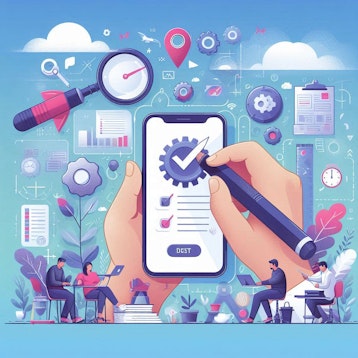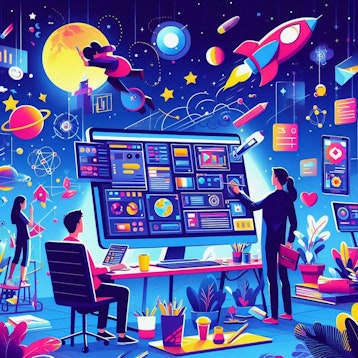Could AI revolutionize your small business marketing?
Artificial intelligence, once a distant sci-fi dream, now powers the heart of modern marketing strategies. For small business owners and marketers, AI isn't merely a tool for automating mundane tasks—it fundamentally changes how companies engage with their customers, analyze consumer behaviors, and fine-tune their marketing operations.
From precise targeting and lead nurturing to content creation and social media management, the scope of AI is broad and impactful. Although AI doesn't eliminate the need for human insight in marketing, its crucial applications are evolving swiftly, bringing new opportunities.
For small businesses, integrating AI isn't just about keeping up with technology—it's about leaping forward to enhanced efficiency, cost-effectiveness, and substantial growth.
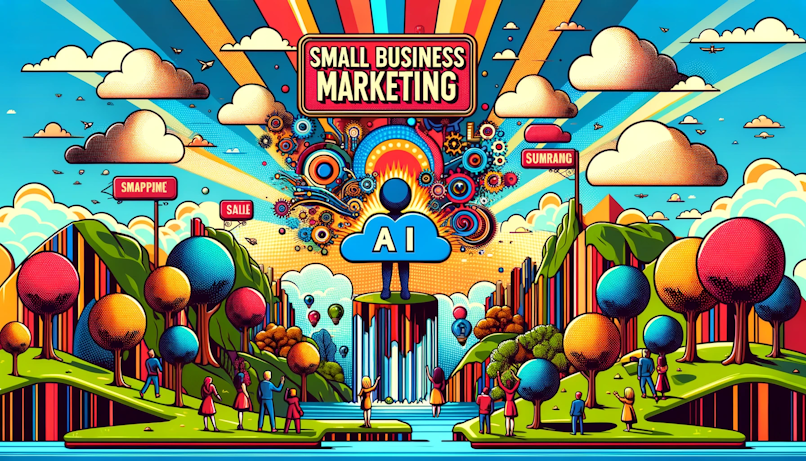
Understanding AI in Modern Marketing Strategies
Artificial intelligence stands out as a key player in business marketing's ever-evolving landscape, playing an instrumental role in changing how brands engage with their customers and adjust strategies. Leveraging AI in marketing goes far beyond operational efficiency: AI offers data-driven insights for more personalized, engaging campaigns. Let's look at some 4 common ways that AI can enhance your small business marketing strategies
1. Automation and Customization at Work
AI excels at automating repetitive tasks, but its true impact extends far beyond saving time. By analyzing large sets of data, AI allows marketers to recognize patterns and preferences, leading them to create highly targeted, personalized marketing messages for every recipient - increasing engagement rates exponentially and driving exponential growth for businesses. AI makes this possible today thanks to its ability to learn from data in real-time while adapting accordingly.
2. Enhance Customer Engagement through AI
AI technologies - particularly machine learning and natural language processing - play a pivotal role in understanding customer behavior and anticipating its next moves, as evidenced by our detailed exploration of AI UX research trends. Chatbots powered by AI provide immediate interaction with customers around the clock - answering queries, offering recommendations and even helping resolve issues - thus making customers feel valued while simultaneously increasing loyalty levels and improving overall customer experiences.
3. Targeting and Segmentation
One of the primary advantages of AI marketing is its ability to analyze large data sets more precisely and segment audiences more precisely. By understanding customer behaviors and preferences, AI-powered tools can target specific segments with tailored messages; this precise targeting not only increases the effectiveness of marketing campaigns but also saves resources by targeting resources on responsive audiences.
4. Data-Driven Decision Making
AI's capacity to quickly process and analyze vast amounts of data is unparalleled, enabling marketers to gain invaluable insights about market trends, consumer behavior, and the effectiveness of marketing strategies. Businesses can go beyond guesswork by making data-backed decisions with AI; whether that means optimizing pricing strategies, selecting suitable channels for promotion, or creating content that resonates with target audiences - AI provides a solid basis for decision-making.
As we explore deeper into the nuances of AI in business marketing, let's explore how this technology is revolutionizing marketing strategies, much like the insights shared in the Harvard Business Review's piece on designing an AI marketing strategy, offering insights and examples that highlight its potential to transform small business marketing landscapes.
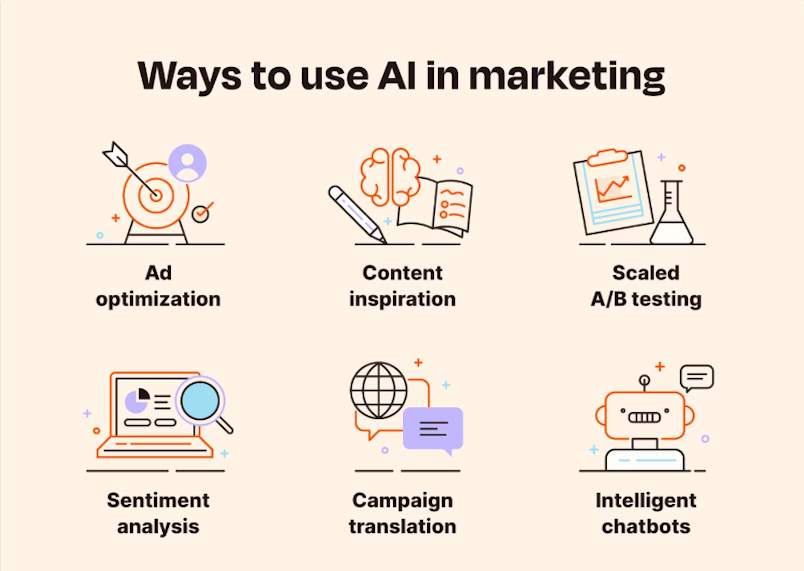
5 Ways AI Tools Enhances Marketing Efficiency
The landscape of small business marketing is undergoing a remarkable transformation, powered by the integration of AI tools. These tools are essential components for precision, efficiency, and innovation in marketing strategies. By automating complex processes and providing deep insights, AI tools enable marketers to focus on creativity and strategy, pushing the boundaries of what's possible in digital marketing.
AI-Driven Content Creation: Revolutionizing Engagement
Content is the backbone of digital marketing and AI tools like ChatGPT offer businesses the ability to generate engaging, relevant content at scale. From crafting personalized email campaigns to creating articles that match the audience's interests and search intent, AI makes it possible to produce high-quality content quickly, as outlined in HubSpot's comprehensive guide on AI in Marketing. This not only enhances engagement but also significantly improves SEO rankings, driving more organic traffic to websites.
Social Media Management: Amplifying Presence and Engagement
Navigating the social media landscape requires time and precision, both of which AI tools adeptly provide. By analyzing user engagement patterns and preferences, AI can schedule posts at optimal times, suggest content that resonates with the audience, and even automate responses to common inquiries. This level of automation ensures a brand's social media presence is vibrant and interactive, fostering a strong community of followers and potential customers.
Lead Nurturing and Conversion: Personalized Pathways to Purchase
AI excels in creating personalized customer journeys. By analyzing individual customer interactions with a brand, AI tools can automate personalized emails, recommend products, and provide timely offers that lead customers down the sales funnel. This targeted approach not only increases the likelihood of conversion but also enhances the customer experience by making interactions feel more personal and relevant.
Paid Ads Management and Conversion
One illustrative example of AI in action is the use of predictive analytics for targeted advertising. Platforms like Google Ads and Facebook use AI to analyze user behavior, interests, and past interactions to place ads in front of users most likely to convert.
Similarly, AI-powered analytics tools provide businesses with insights into campaign performance, audience behavior, and market trends, similar to the examples highlighted in fit small business's overview of AI marketing tools. enabling them to make data-driven adjustments to their strategies in real-time.
Exploiting the power of AI tools in business marketing is not just a trend; it's a strategic requirement for companies looking to stay competitive in a digital-first world. As these technologies continue to evolve, the potential for innovation in marketing strategies is boundless, promising a future where AI and creativity go hand in hand to create marketing magic.
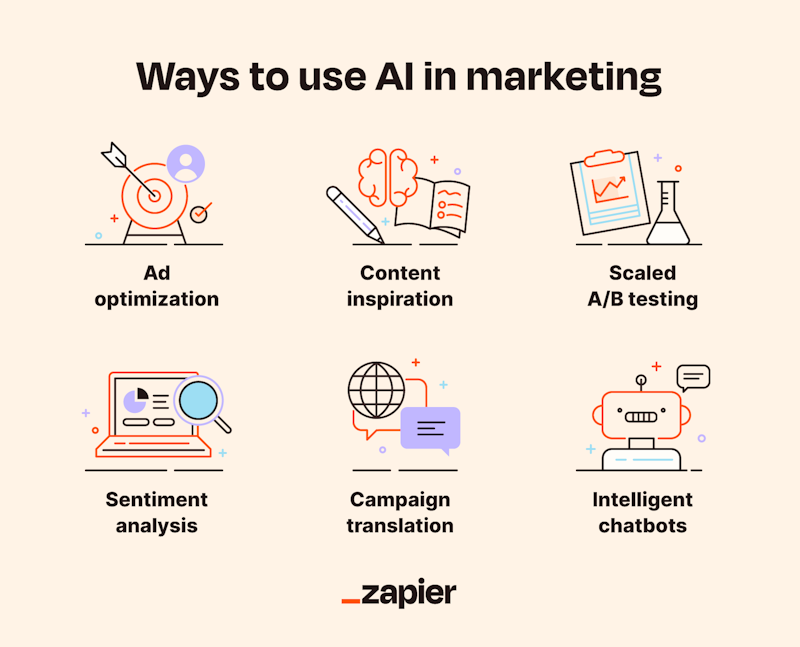
How to Prepare for a Future Powered by AI
As small businesses navigate the reality of AI, the following points provide a concise overview of how AI tools are not only accessible and user-friendly but also pivotal in transforming business operations. Let's explore practical insights into adopting AI in your business strategy.
Accessibility of AI Tools: Small businesses can easily embark on their AI journey without hefty budgets or deep technical expertise. AI tools are designed to be user-friendly and cost-effective, making them accessible for businesses of any size. Want to dig deeper into marketing AI tools? This past blog on AI market research tools has all the information you need.
Strategic AI Implementation: Begin by applying AI to one or two key business areas where its impact can be quickly realized, such as enhancing customer service or streamlining marketing automation.
Impact of AI in Business Marketing: The transformative power of AI in business marketing is profound. For small businesses, leveraging AI is not just about adopting technology; it's about capturing opportunities for growth, and differentiation, and establishing a competitive edge in the digital marketplace.
5 Challenges of Integrating AI Into Small Business Marketing
As artificial intelligence AI becomes an integral component of business marketing strategies, its implementation presents its own set of challenges. While small businesses and marketers may find the process daunting at first, with proper preparation they can be overcome - understanding these hurdles is key to unlocking AI's full potential in further boosting marketing efforts and driving business expansion.
Let's examine some of the common blockers business owners come across when integrating AI into their small businesses.
1. Technical Integration and Compatibility: Adopting AI tools often presents a significant challenge in integrating with existing systems and workflows. This process can be especially complex and time-consuming when ensuring compatibility between new AI technologies and legacy systems.
Small businesses, typically with limited IT resources, may find this hurdle particularly daunting. To address these issues, AI solutions tailored for small businesses frequently offer plug-and-play functionality, reducing the disruption and technical demands during implementation.
2. Concerns About Data Privacy and Security: As AI technologies rely heavily on data to deliver personalized marketing strategies, concerns around data privacy and security become paramount, a topic we address in our discussion on ethical design.
Businesses must find a balance between using customer data for personalized advertising while respecting privacy regulations like GDPR as well as being transparent with customers about how their information is used and protected to effectively mitigate concerns while building trust among clients.
3. Learning Curve and Resource Allocation: Implementing AI into marketing strategies also presents a learning curve. Training staff to use and interpret AI tools effectively takes time and investment; allocating sufficient resources may prove a difficult challenge for smaller businesses.
However, its long-term benefits of increased efficiency and enhanced decision-making capabilities typically outweigh such initial investments. Partnering with vendors who offer support and training services may ease this transition process further.
4. Keep Pace With Rapid Technological Advancements: AI technologies are constantly developing, offering new tools and functionalities. Staying abreast of their progress and adapting marketing strategies accordingly can be daunting for businesses; keeping up with industry news, attending relevant webinars, and networking with tech-savvy peers are effective strategies for remaining agile and responsive to potential opportunities brought about by these innovations.
5. Addressing AI Bias and Ethical Concerns: AI systems are only as unbiased as the data they're trained on, a challenge discussed in depth in Forbes's examination of AI in business and marketing, leading to unintentional biases in AI algorithms that result in marketing strategies that alienate certain customer segments. Addressing such biases requires monitoring, evaluating, and adjusting AI models continuously to maintain fairness and inclusivity in marketing efforts.
AI integration offers outstanding opportunities for efficiency, personalization, and strategic insight for business marketing. By approaching these hurdles with an informed, proactive, and strategic mindset businesses can unlock AI's full potential, turning challenges into avenues towards innovation and growth. Although patience may be needed on this journey to success in the digital age marketing landscape, rewards promise a new standard for success that redefines the marketing landscape.
5 AI Future Trends in Small Business Marketing
AI's role in small business marketing is not just promising; it is transformative. AI is rapidly making an impactful presence known in this space, with new trends that will shape how businesses connect with customers, personalize experiences, and drive growth - this information is crucially important for marketers and business owners in an increasingly competitive landscape.
Here are 5 powerful ways that experts have predicted that AI will change the future of marketing for not just small-scale businesses but large corporations as well.
Voice Search and Conversational AI: The rise of voice search and conversational AI is changing the way consumers find information and make purchasing decisions, a transformation further discussed in our piece on how to use ChatGPT 4.
With more households adopting smart speakers and voice-activated devices, optimizing voice search has become essential. Conversational agents capable of understanding natural language and providing instant responses have set new standards in customer interaction - giving businesses that integrate conversational AI into their digital platforms an edge in reaching customers through these emerging channels.
AI-Driven Customization at Scale: AI in marketing promises an age of unprecedented personalization. Machine learning algorithms enable businesses to personalize marketing messages, offers, and experiences based on customer preferences and behaviors at scale; going far beyond basic segmentation to offer relevant details that truly resonate with each customer. As AI technologies advance further and refine these capabilities further, companies that leverage these personalization techniques will stand out, increasing loyalty while driving conversion rates.
Predictive Analytics and Decision Automation: Predictive analytics powered by AI is revolutionizing marketing decision-making. By analyzing historical and current data trends, this advanced technique enables AI to predict future customer behaviors, market dynamics, and campaign outcomes - giving marketers insight to make informed decisions more efficiently and tailor strategies according to anticipated changes in the market. Plus, its real-time decision capabilities ensure more dynamic and responsive marketing tactics.
Ethical AI and Responsible Marketing: As Artificial Intelligence becomes an ever-more vital part of marketing, ethical considerations and responsible use of technology become ever more crucial. Businesses will need to navigate the complexities of using AI responsibly by respecting customer privacy, maintaining data security, and avoiding bias - these ethical AI practices not only fulfil regulatory requirements but can be seen as competitive differentiators that build trust and boost brand reputation.
Combining AI with Augmented and Virtual Reality: The intersection of AI with augmented reality AR and virtual reality VR technologies is opening new frontiers, as detailed in the Marketing AI Institute's guide to AI in marketing AI-enhanced AR and VR applications can customize user experiences based on user data, improve interactivity, and optimize content delivery, creating immersive marketing experiences that engage customers, highlight products, and foster memorable brand interactions.
As we embrace these future trends, business marketing is poised for an immense transformation. AI integration will not only complement current strategies but will also open up entirely new doors of innovation and growth. Marketers who anticipate and adapt to these changes will flourish by using AI to foster more meaningful connections while driving efficiency and maintaining their competitive edge in the digital future.
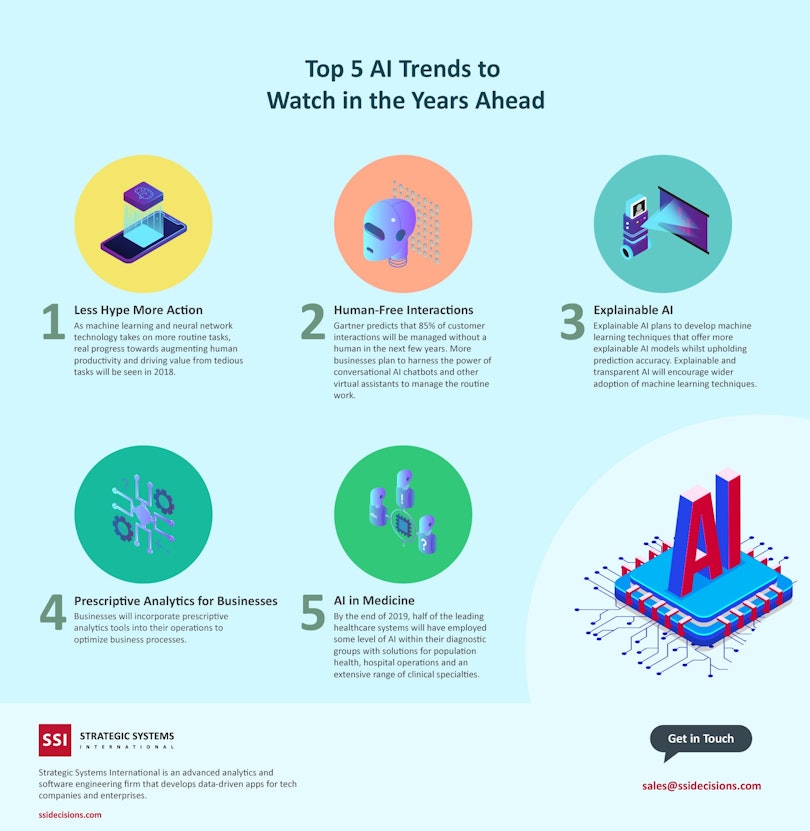
Conclusion
AI technology has revolutionized small business marketing by automating tasks, personalizing customer experiences, and deriving actionable insights from data. This shift allows small businesses to streamline operations, enhance customer engagement, and target marketing efforts more effectively, opening up new growth opportunities.
However, integrating AI into marketing strategies comes with challenges such as technical barriers, data privacy issues, and the need for ongoing adaptation. Despite these hurdles, the potential benefits of AI, including driving innovation and business success, significantly outweigh the difficulties.
The future of AI in marketing is promising, with emerging trends like voice search optimization and conversational AI to hyper-personalization and predictive analytics expected to further transform the industry. For more on this, check out our previous article on AI marketing trends.
Success in this evolving landscape requires a commitment to innovation, ethical practices, and continuous learning. Businesses that quickly adapt to AI can achieve significant efficiency gains and a competitive advantage. Incorporating AI into marketing strategies is essential for redefining industry standards and unlocking new business potential.


